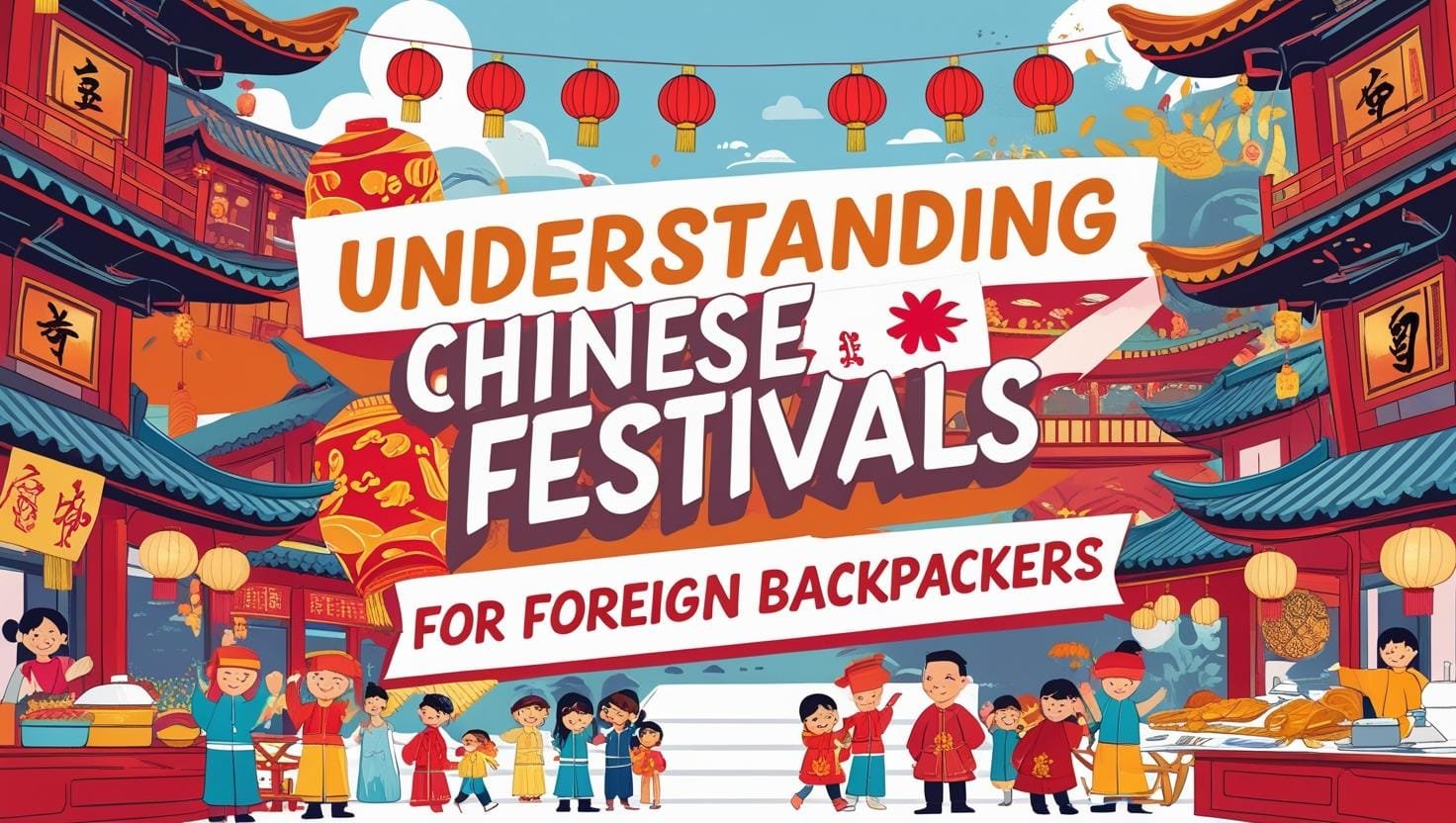“`html
Understanding Chinese Festivals: A Foreign Backpacker’s Guide
China, a country of ancient history and vibrant modern culture, offers a treasure trove of experiences for those who dare to explore. Here at jusha.travel, we believe one of the best ways to truly immerse yourself in Chinese culture is by experiencing its festivals. This guide is designed for foreign backpackers looking to navigate these incredible celebrations while sticking to a budget. Understanding Chinese festivals will not only enrich your travel experience but also give you invaluable insights into local traditions and China events. Prepare for an unforgettable journey of cultural immersion!
Why Understanding Chinese Festivals Matters
For backpackers, cultural immersion is often the ultimate travel goal. Chinese festivals offer a direct portal into the heart of China’s soul. They are a vibrant expression of centuries-old traditions, beliefs, and values. Far from being mere holidays, these festivals are opportunities to witness spectacular displays of art, music, cuisine, and community spirit. Engaging with these events allows you to move beyond the typical tourist experience and connect with locals on a deeper level.
Attending festivals can also be practical. During Chinese festivals, you’ll find unique street food and local crafts that usually aren’t available. Moreover, understanding the timing of these festivals is crucial for budget travel. Keep in mind that transportation and accommodation prices can surge during major holidays like Chinese New Year and the Mid-Autumn Festival. Planning your trip around less crowded, lesser-known festivals can save you money, making your backpacking experience more affordable and enjoyable.
Essential Festivals for the Budget Traveler
Let’s explore some key festivals that offer rich cultural experiences without breaking the bank:
- Chinese New Year (Spring Festival): Arguably the most important festival in China, it’s a time for family reunions, grand feasts, and vibrant celebrations. While travel during this period can be expensive, experiencing the electrifying atmosphere of dragon dances and firework displays is unforgettable. To save money, book your transportation and accommodation well in advance.
- Qingming Festival (Tomb Sweeping Day): A more somber festival where families pay respects to their ancestors. It’s a great time to delve into Chinese history and experience a quieter, more reflective side of the culture. Many parks and historical sites host events, and entry fees are typically minimal.
- Dragon Boat Festival (Duanwu Festival): Celebrated with dragon boat races and the eating of zongzi (sticky rice dumplings). Cities along rivers, such as those in the Yangtze Delta, host particularly impressive races. Enjoy the festivities by buying zongzi from local vendors and cheering on the teams.
- Mid-Autumn Festival (Moon Festival): A celebration of the harvest and the full moon, it’s a time for family gatherings and sharing mooncakes. This festival has a romantic ambiance, with beautifully lit lanterns and a sense of togetherness. Purchase mooncakes from local bakeries and find a scenic spot to enjoy the moonlit sky.
Backpacking Tips for Festival Season
Navigating Chinese festivals as a backpacker requires some strategic planning. Embrace these backpacking tips to enhance your experience:
- Plan Ahead: Research festival dates and book accommodations and transportation well in advance, especially for major festivals.
- Learn Basic Mandarin Phrases: Knowing a few key phrases will help you navigate crowded spaces and interact with locals. Simple greetings and phrases like “How much?” or “Thank you” can go a long way.
- Embrace Local Transportation: Utilize public transportation options like buses and subways to save money. Avoid taxis during peak festival times, as traffic can be heavy and prices inflated.
- Try Street Food: Festivals are a fantastic opportunity to sample a variety of local street food at affordable prices. Be sure to try regional specialties associated with each festival.
- Be Respectful of Local Customs: Observe local customs and traditions. When visiting temples or ancestral sites, dress modestly and follow any guidelines provided. Participate respectfully in ceremonies and celebrations.
Deeper Dive into Local Traditions
Beyond the grand celebrations, festivals are steeped in fascinating local traditions. During Chinese New Year, for instance, it’s customary to give red envelopes (hongbao) filled with money to children and unmarried adults. The color red symbolizes good luck and prosperity. Understanding the significance of these customs enhances your cultural immersion and demonstrates respect for local culture.
The Dragon Boat Festival is another example. The tradition of eating zongzi stems from the story of Qu Yuan, a patriotic poet who drowned himself in the Miluo River. People threw rice dumplings into the river to prevent fish from eating his body. Today, the zongzi represents remembrance and respect.
Maximizing Cultural Immersion on a Budget
Cultural immersion doesn’t have to be expensive. Here are some tips for the budget-conscious traveler:
- Stay in Hostels or Guesthouses: These offer budget-friendly accommodations and opportunities to meet other travelers.
- Eat at Local Eateries: Ditch the fancy restaurants and explore local eateries for authentic and affordable cuisine.
- Attend Free Events: Many festivals offer free events, such as street performances and cultural exhibitions.
- Volunteer: Look for volunteer opportunities at local organizations or community events. This is a great way to connect with locals and gain a deeper understanding of the culture.
- Learn a Skill: Consider taking a short-term class in something like calligraphy, dumpling making, or tai chi.
Conclusion
Understanding Chinese festivals is key to unlocking a richer, more immersive travel experience in China. By embracing local traditions, planning your trip strategically, and sticking to a budget, you can enjoy unforgettable celebrations and deeper cultural connections. Remember to respect local customs, engage with the community, and savor the unique atmosphere of each festival. Visit jusha.travel for more China travel inspiration and resources. Now, we’d love to hear from you! Which Chinese festival are you most excited to experience, and what questions do you have about planning your trip? Share your thoughts and questions in the comments below!
“`

